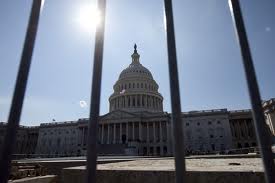Shut it Down – Obama Can Save the Country from Default
– Christopher Carroll
President Obama and Senator Harry Reid can win the federal budget and debt limit debates. They can do it by letting Republicans walk into their own trap. By allowing the federal government to shut-down, they can save the country and economy from the much worse disaster of debt default.
After the Senate passed, in an expedited procedure, a bill that would have temporarily funded the government and avoided an impending shutdown while preserving Obamacare, House Republicans again refused to comply with the President and Senate democrat’s refusal to involve Obamacare.
Saturday brought more drama to the political stage. Following a rare Saturday meeting, House Republicans passed a Continuing Resolution that will temporarily fund the government while delaying Obamacare for one year.
House Speaker Boehner had indicated a desire to direct House Republicans to pass the Senate’s version of the continuing resolution, thereby rallying strength for the approaching debt limit battle. He was, however, unable to muster support from within his party for his strategy. The unruly caucus proved too much for Boehner to handle, bucked his leadership and insisted on delaying the A.C.A in any agreement.
The House GOP, by not following Speaker Boehner’s advice, has given the Obama administration and Senate Democrats a get out of jail free card. Even after democrats vociferously and publicly refused to defund, delay or compromise the A.C.A in all budget or debt limit negotiations, the Republican’s stubborn insistence that they do just that will allow President Obama and Senator Reid to justify allowing the government to shut down. While a shutdown would be disruptive, a default would be catastrophic.
****
President Obama and Harry Reid should let the government shutdown. It would give them political power in negotiations over the debt limit, due to be reached by October 15.
At this point, avoidance of a federal shutdown will likely only take place if Republicans concede to Democratic firmness and public disapproval. If this were to happen, Republican lawmakers would likely return to the debt limit debate with a vengeance, insisting that in return for raising the debt limit they receive any number of their priorities. Given Democratic unity on the federal budget, it is unlikely that they would succumb to Republican coercion and the country and economy would be thrown into turmoil. This must not happen.
Instead, President Obama and Congressional Democrats should allow the Republicans to fall victim of a trap of their own making. By allowing the government to shut down, they would be allowing national distress on a relatively minor scale; the economy would falter due to uncertainty, federal employees would be furloughed and unprotected federal programs would be suspended. A debt default, on the other hand, would be catastrophic. The economy would stagger, the world markets would shiver and the countries credit rating would be slashed. The economic recovery will not sustain blows of that magnitude.
By allowing a federal shutdown, Obama may be able to avoid economic disaster by teaching the country, and Republicans, through the lens of experience. The country and economy will be forced to watch the effects of a government shutdown and not only hold them responsible, but fear the vastly more painful debt default.
Republicans have been rewarded for their recent spates over the federal budget and debt limit. It is becoming commonplace for the nation to watch budgetary conflicts every year in Washington D.C. The Republican party, who recently have had relatively little political leverage, are finding themselves able to control debates and manufacture influence through budgetary and debt negotiations. Only if the President and Democrats refuse to be coerced and blackmailed through CRs and debt limit increases will a seemingly perpetual cycle break.
If Obama doesn’t give in to discussions, he may be able to save the country the pain of default. By allowing Republicans to buck their own leadership, President Obama will allow the G.O.P to step into a trap that they themselves have set.
Filed under: D.C Playground, Economic Recovery, Mandate to Debate - policy discussion | Tagged: Affordable Care Act, Debt Ceiling, Debut Limit, Government Shutdown, Harry Reid, John Boehner, ObamaCare | Leave a comment »












